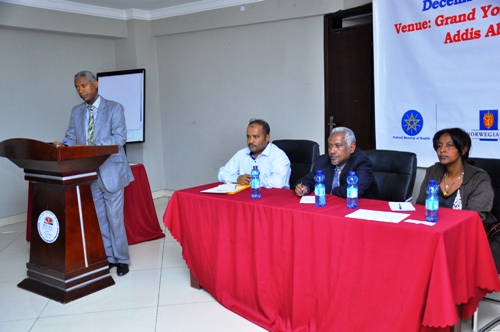
The meeting was organized by the Ethiopian Society of Obstetricians and Gynecologists (ESOG) and the Federal Ministry of Health (FMoH) in collaboration with the Royal Norwegian Embassy. The consultative meeting witnessed participants from major stakeholders including those from ESOG, FMoH, the Roayal Norwegian Embassy, Regional Health Bureaus, Path Finder, , the Orthodox Church, the World Health Organizations (WHO) and others.
The consultative meeting saw scientific presentations from Dr. FikerMelese, Dr. Solomon Kumbi, Dr. Mutesim Abdulahi and Dr. Wondimu Gudu and Sr. Etenesh Gebreyohannes. Participants deliberated on the scientific presentations entitled Global Perspective of FGM and WHO Guidelines, Introduction to FGM and Its Complications, Complications of FGM, Jigjiga Study and Activities being Undertaken by the Federal Ministry of Health on FGM.
Participants deliberated well on areas ranging from the collaboration that must be sought among institutions to slow down the harmful practice, the role that can be played by Members of the Parliament and religious leaders and institutions, the significance of community based conversations to the role of the media and many others.
It was understandably concerning to participants that even though the statistics at a national level showing the rate of FGM related incidents has declined in the newly released Demographic and Health Survey, incidents show no improvement in some regions, Somali and Afar in particular.
“… I have witnessed girls lined up begging to get mutilated,” said Sartu Shemsudin, from the EIASC, IRCE, in explaining the need to work on those who are not mutilated as much as on those who have been mutilated and those who get mutilated by influence from their respective communities.
The meeting also saw group discussions on policy, prevention and care and support for FGM victims. The group discussions were followed by presentations and respective deliberations.
“We have also shared our thoughts on the fact that the health sector should not only be concerned about the health aspect of the matter, rather go beyond to address community and social aspects and administrative issue to make better public awareness,” said W.ro Yamirot Andualem, director for Women and Youth Affairs of Federal Ministry of Health.
